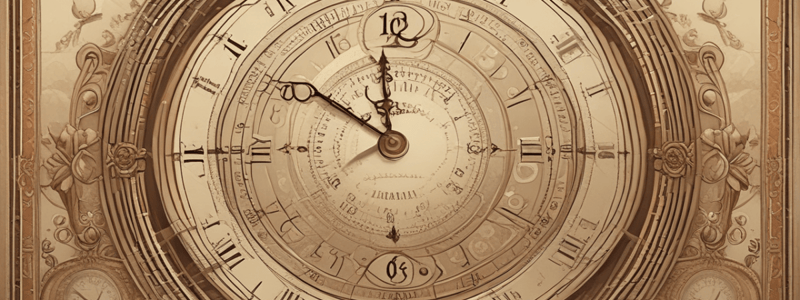Podcast
Questions and Answers
What is the French phrase for 'what time is it?'
What is the French phrase for 'what time is it?'
- Quelle heure est-il? (correct)
- Quelle est l'heure?
- Quel est le temps?
- Quel est l'heure actuel?
Which of the following is NOT a time marker in French?
Which of the following is NOT a time marker in French?
- Le matin
- L'après-midi
- La nuit
- La saison (correct)
What is the French phrase for 'twenty-four hours'?
What is the French phrase for 'twenty-four hours'?
- Minuit
- Douze heures
- Vingt-quatre heures (correct)
- Vingt heures
What is the French word for 'clock'?
What is the French word for 'clock'?
What is the French phrase for 'quarter past'?
What is the French phrase for 'quarter past'?
What is the French word for 'Tuesday'?
What is the French word for 'Tuesday'?
What is the French phrase for 'midnight'?
What is the French phrase for 'midnight'?
What is the French word for 'appointment'?
What is the French word for 'appointment'?
Flashcards are hidden until you start studying
Study Notes
Time and Schedule
- Time: "l'heure" (feminine)
- Asking for the time: "quel heure est-il?"
- Time-related phrases: "exactement" (exactly), "en retard" (late), "en avance" (early)
Numbers (1-12)
- One: "un(e)"
- Two: "deux"
- Three: "trois"
- Four: "quatre"
- Five: "cinq"
- Six: "six"
- Seven: "sept"
- Eight: "huit"
- Nine: "neuf"
- Ten: "dix"
- Eleven: "onze"
- Twelve: "douze"
Time Markers
- Morning: "le matin" (masculine)
- Afternoon: "l'après-midi" (masculine or feminine)
- Evening: "le soir" (masculine)
- Night: "la nuit" (feminine)
- O'clock: "heure" (only used with "midi" and "minuit")
- Quarter: "quart"
- Half: "demi(e)"
- Quarter past: "moins le quart"
24-Hour Clock
- 24 hours: "vingt-quatre heures"
- One hour: "une heure"
- Two hours: "deux heures"
- Three hours: "trois heures"
- And so on...
Days of the Week
- Monday: "lundi" (masculine)
- Tuesday: "mardi" (masculine)
- Wednesday: "mercredi" (masculine)
- Thursday: "jeudi" (masculine)
- Friday: "vendredi" (masculine)
- Saturday: "samedi" (masculine)
- Sunday: "dimanche" (masculine)
Other
- Clock: "l'horloge" (feminine)
- Watch: "la montre" (feminine)
- Alarm clock: "le réveil" (masculine)
- Bell (ring): "la sonnerie" (feminine)
- Calendar: "le calendrier" (masculine)
- Appointment: "le rendez-vous" (masculine)
Bonus
- Midnight: "minuit" (masculine)
- Noon: "midi" (masculine)
- Soon: "bientôt"
- Now: "maintenant"
- Late: "tard"
- Early: "tôt"
Telling Time On An Analog Clock
- An analog clock has two hands: a short hour hand that points to the hour and a long minute hand that points to the minutes
- To tell time on an analog clock, identify the hour by looking at the hour hand, then identify the minutes by looking at the minute hand, and finally combine the hour and minutes to tell the time
AM/PM
- AM (Ante Meridiem) refers to morning hours from 12:00 AM to 11:59 AM
- PM (Post Meridiem) refers to afternoon and evening hours from 12:00 PM to 11:59 PM
- Midnight is 12:00 AM and noon is 12:00 PM
Digital Time
- Digital time displays hours and minutes in numeric format, such as 12:45
- Digital time can be displayed in 12-hour or 24-hour format
- The 24-hour format is used in military, medical, and technical fields, where 14:30 is equivalent to 2:30 PM
Time Zones
- Time zones are regions on Earth that follow a uniform standard time
- Time zones are identified by their offset from Coordinated Universal Time (UTC)
- Examples of time zones include Pacific Standard Time (UTC-8), Eastern Standard Time (UTC-5), and Greenwich Mean Time (UTC+0)
Scheduling
- Scheduling involves planning and organizing events and activities at specific times
- Important concepts in scheduling include start time, end time, and duration
- Scheduling can be done using analog or digital clocks, calendars, or digital tools such as smartphones or computers
Studying That Suits You
Use AI to generate personalized quizzes and flashcards to suit your learning preferences.




